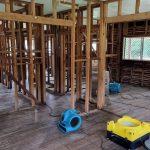Embarking on a drywall installation project necessitates a thorough understanding of various techniques and strategies that can significantly improve the overall process. Whether you’re considering upgrading a room or undertaking a complete drywall replacement, possessing comprehensive knowledge is crucial for success. Before enlisting the help of a handyman, it’s essential to familiarize yourself with several key aspects to avoid potential pitfalls. This includes checking the handyman’s licensing, understanding the cost of drywall installation, and choosing a qualified professional who meets your specific requirements and expectations.
Essential Steps for Obtaining a Handyman’s License for Professional Drywall Installation
For anyone aspiring to enter the drywall installation industry, obtaining a handyman’s license should be a top priority. While not mandatory in every state, many states require this credential to ensure compliance with local regulations. To determine if you need a license, start by researching the specific licensing requirements in your state, as understanding these regulations is the first step in your journey.
For minor tasks like painting or small appliance repairs, most jurisdictions do not require a handyman’s license. However, for larger projects, you may need to acquire separate licenses for each specific task, depending on local laws and regulations. This knowledge is vital to ensure you are operating within legal boundaries and protecting yourself from potential fines.
In addition to securing a handyman’s license, it is equally important to obtain insurance. A contractor’s liability and property damage insurance policy acts as a safeguard against potential injuries or damages that could occur during the project. If you plan to hire workers, securing workers’ compensation insurance is also necessary to protect both your employees and your business. Reviewing construction plans meticulously will help you accurately estimate material and labor costs, allowing you to submit competitive bids while ensuring quality standards are maintained.
When applying for a handyman’s license specifically for drywall installation, there are several requirements that must be satisfied. For example, in Georgia, applicants must pass trade, business, and law examinations. Additionally, having a minimum of two years of hands-on experience as a handyman, along with proof of general liability and workers’ compensation insurance, is essential. If your projects exceed $1,000 or involve obtaining construction permits across different jurisdictions—such as in Hawaii—you will also need a general contractor’s license to operate legally.
While a handyman’s license for drywall installation may not be universally required, it is highly advisable if you plan to tackle more extensive work beyond simple repairs and installations. Each state has its own set of requirements, often involving having liability insurance and a handyman’s license to shield against potential legal troubles and property damage claims that could arise during the course of your work.
To excel as a handyman, it’s critical to familiarize yourself with the varying standards and licensing requirements that exist across states. Significant differences often arise at the local level regarding handyman licenses, making it necessary to conduct thorough research if you intend to handle diverse projects competently and effectively.
In-Depth Analysis of Drywall Installation Costs
The overall cost of drywall installation is influenced by numerous factors, including the scope of the project and the types of materials utilized. For instance, larger holes may require complete drywall replacement, which can greatly impact the total expense. Moreover, the quantity of materials needed will directly correlate with both material and labor costs, making it essential to accurately assess the size and complexity of the job. A skilled handyman can generally complete smaller tasks within just a few hours, making it a practical option for many homeowners looking to enhance their living spaces.
Conversely, extensive drywall repairs due to significant holes or water damage require more time and effort. In severe cases, it may be necessary to remove and replace entire sections of drywall, a scenario that often demands the expertise of a professional with specialized skills. This can consequently lead to increased overall costs involved in the project, emphasizing the importance of careful planning and budgeting.
Effective planning and preparation are critical components of drywall installation. A thorough checklist of supplies and tools is essential, with the overall cost hinging on both the area’s size and the job’s complexity. Handymen often require additional labor support, particularly for larger endeavors that may extend beyond their immediate capabilities. Furthermore, the installation cost can vary based on whether prep work and cleanup are part of the project. Complex ceiling designs or numerous corners can also lead to increased material and labor expenses, underscoring the necessity for meticulous planning.
The type of drywall chosen will significantly affect the total installation cost as well. Standard drywall is commonly used in most commercial constructions and is available in a variety of widths and thicknesses, offering flexibility and choice based on specific project requirements. Selecting the right type of drywall is essential to ensure durability and functionality in the finished product.
As the scale of tasks increases, expenses can accumulate rapidly. The overall cost is largely contingent upon the project’s size and intricacy. Smaller jobs may incur a higher cost per square foot, yet drywall remains a more economical option compared to other construction materials, striking a balance between quality and affordability that appeals to many homeowners.
While hiring a handyman might seem like a cost-effective choice, engaging the services of a drywall specialist can provide significant advantages. Specialists possess the necessary expertise for a range of tasks, from removing popcorn ceilings to constructing drop ceilings. Their proficiency in taping joints and applying textures ensures superior workmanship. Additionally, they are adept at addressing issues such as water damage, hole repairs, and more intricate textures that may arise during the installation process.
When selecting a drywall contractor, it’s imperative to acquire a detailed contract that clearly outlines the project scope and associated costs. This contract should specify the number of drywall sheets required, the type of material to be used, and a comprehensive breakdown of labor and material expenses, thereby ensuring transparency and clarity throughout the duration of the project.
Crucial Factors to Consider When Selecting the Right Handyman for Your Drywall Projects
Before you commit to a handyman for your drywall installation needs, it’s essential to ask several important questions to ensure you make a well-informed choice. Start by inquiring about the estimated timeline for project completion. Even highly skilled drywall installers may have varying schedules, so understanding the timeframe will help you avoid dissatisfaction upon project completion and ensure that your timeline aligns with your expectations.
It’s advisable to interview at least three potential handymen before making a final decision. During these interviews, inquire about their relevant experience and request references from past clients. Confirming that the handyman you select possesses the necessary skills and tools for the job is critical to achieving the best possible outcome. Additionally, ensuring that their services fit within your budget is vital for a smooth and successful experience.
Next, evaluate the potential costs associated with drywall installation. By comparing bids from different contractors, you can gain valuable insights into the typical rates for your project. A reputable contractor will provide a comprehensive cost breakdown that includes all materials, supplies, and any additional expenses, giving you a clearer picture of the financial commitment involved and helping you make a more informed decision.
Verifying credentials and insurance is another pivotal step before hiring a handyman. Obtaining a written contract along with references can provide peace of mind and help you confirm that the handyman is the right fit for your project. Requesting examples of their previous work will bolster your confidence in your decision, ensuring you are selecting a skilled professional capable of meeting your specific requirements.
An effective handyman should possess a diverse skill set, allowing them to tackle a variety of tasks beyond just drywall installation. For instance, if your ceiling has a hole that necessitates drywall work, a proficient handyman should also be capable of handling related tasks, such as installing new light fixtures or repairing popcorn texturing, thus providing a comprehensive solution to your home improvement needs.
Thoroughly checking the handyman’s experience and references before finalizing your choice is essential. An experienced handyman is more likely to execute the job competently, thereby increasing the chances of a successful project outcome. It’s wise to avoid contractors who rely on high-pressure sales tactics or have inflated advertising budgets, as these approaches can often lead to subpar results and dissatisfaction.
Keep your budget in mind when hiring a handyman for drywall installation. An efficient handyman should be able to complete the job in a timely manner while respecting your property and minimizing disruptions. They should also prioritize cleanliness, ensuring that the workspace remains tidy after the project is complete, thus enhancing your overall satisfaction with the entire process.
A handyman knowledgeable in plumbing and electrical systems is an excellent choice for addressing leaks or undertaking related tasks. They can also assist with a wide range of projects, including hole repairs, light painting, deck repairs, and drywall installations, offering a well-rounded approach to home improvement that can save you time and money in the long run.
Finding a reliable handyman in your area is entirely achievable. Investigate online reviews and seek recommendations from friends and family to identify trustworthy professionals. Additionally, don’t hesitate to ask your handyman for client references to validate their reputation and capabilities, ensuring you make the best choice for your project.
The post How Does a Handyman Do Drywall Installation? appeared first on https://gqcentral.co.uk
The Article Drywall Installation Techniques by a Handyman Was Found On https://limitsofstrategy.com
The Article Handyman Tips for Effective Drywall Installation Techniques First Appeared ON
: https://ad4sc.com




Your breakdown of the drywall installation process really got me thinking about just how crucial it is to have the right knowledge before diving into a project like this. I remember when I attempted to install drywall in my basement; it felt like a straightforward task until I realized how much there was to consider, like the moisture levels and the need for a vapor barrier since basements can be particularly tricky. Your mention of checking the handyman’s license is spot on. I had a friend who unfortunately didn’t do this and ended up with subpar work—not to mention the headache of finding someone to fix it later.
It’s funny how something that looks so simple—just a few sheets of drywall, right?—can quickly turn into a multi-layered puzzle involving moisture levels, vapor barriers, and a good dose of patience. The basement is like the Bermuda Triangle of home projects; you never know what you’ll find lurking in there. Your experience hits home; one minute you’re feeling like a DIY king, and the next, you’re grappling with concepts that sound more like they belong in a science class than your living room.